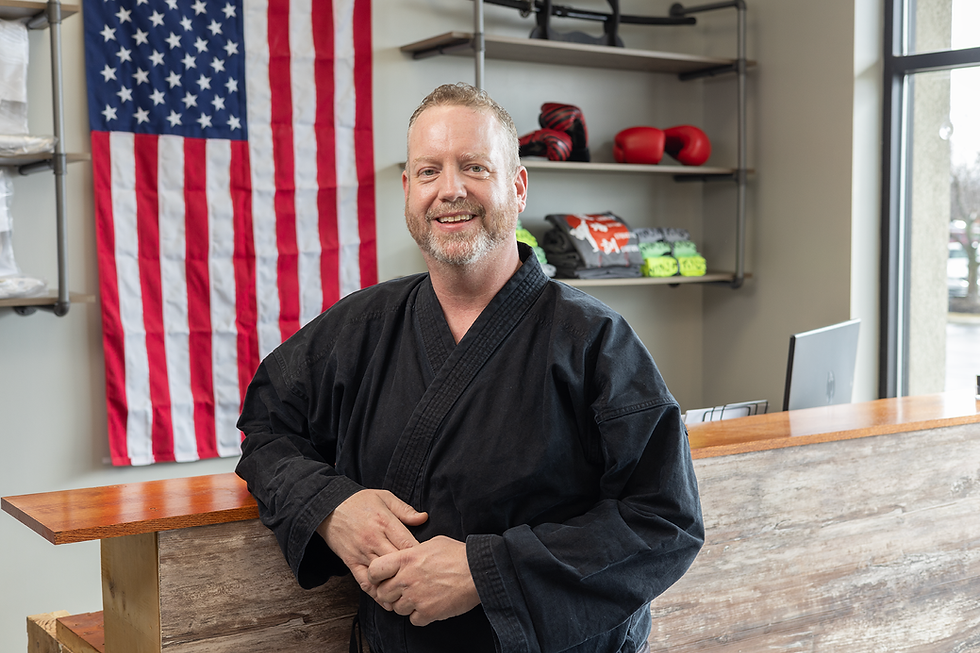Building Confidence, Control, and a Way of Life
- sfrew6
- Aug 14, 2023
- 3 min read
“Karate isn’t about fighting,” said David Anders, Sensei and Owner of Karate Works, A Maumee, Ohio dojo founded in 2016. “It’s an art form. It's about confidence, control, and learning to move your body deliberately. It’s about thinking ahead. It’s about empathy and respect for others. Sure, it can be self-defense, but it’s so much more than that. It’s a way to strengthen your mind and body. It’s a way of life.”
Anders tells students that karate isn't even about natural athleticism. “I'd rather take a kid in band than a natural athlete because they take the time to learn the art and forms, then the athleticism comes. With a naturally gifted athlete, I need to teach them to slow down and learn the finer points and precision, he said.
Anders began studying karate at age 12. Growing up in a disadvantaged home, he found that karate was a great outlet and a great place to meet people. "Eventually, my Sensei had me teaching classes. It gave me a lot of confidence to talk in group settings," Anders said.
After high school, Anders immediately joined the military. “My Sensei wanted me to help open a second location, but I needed life experience,” he said. After the military, Anders went to college, then joined the police force in Florida. Five years later, he came back to Ohio. “I could have easily skipped the military, skipped college, skipped everything else, and started teaching karate full time, but I learned so much. I’ve worked in some of the worst places in the world — in some very scary situations where you'd think you'd have to use martial arts, but nine times out of ten, you just need to use your brain and mouth. So with that real-life experience, I feel confident to talk to students who might be scared to go out there in the world or scared to be approached by someone intimidating. Now I can say I’ve been there, and I teach them how to feel confident and safe in tense situations,” he said.
Karate Works is unique among dojos in that Anders teaches all of his classes himself. It’s more commonplace now for dojos to use assistants or star students to teach classes. “It's not the same as learning from the person who told you they would teach your child. I want people to know they're learning from me." he said.
Another unique aspect of the dojo is the set of cameras Anders installed so parents can watch his lessons. "Parents can log in at any time and see what's happening on the floor, which protects the kids and protects us,” he said. In addition to transparency and safety, the cameras serve another important purpose at Karate Works. Anders is recording lessons so his students can practice at home. “One of the hardest things is getting children to practice, but we've had a lot of success with this technology. Kids are getting that next belt faster because they're working harder. Eventually, we might offer hybrid lessons over Zoom and in-person or just online for a reduced fee," Anders said.
"ECDI made the whole loan process practically effortless... On top of that, they helped with refining my business plan and researching my competitors. Their mentorship was invaluable.”
Cameras, mats, equipment, and advertising are costly, so Anders got some help from ECDI. "They're just very, very helpful. I had some grants from being a veteran, but I needed extra funding. ECDI made the whole loan process practically effortless,” he said. "I was able to move out of a fitness studio I was renting into my own space on the busiest street in Maumee, with a big sign out front. On top of that, they helped with refining my business plan and researching my competitors. Their mentorship was invaluable.”
Anders gets excited thinking about the future possibilities of Karate Works. In addition to expanding the technology he’s using for classes, he wants to offer yoga in the morning and give private lessons for corporate wellness initiatives to keep employees healthy. “Mostly I just want to build up this dojo and keep teaching," he said. "You know, when karate students bow to their Sensei, people assume it's a respect thing, and it is, but it goes both ways. I respect my students, and I learn from them as well. In karate and as an entrepreneur, you have to be humble to go far."











